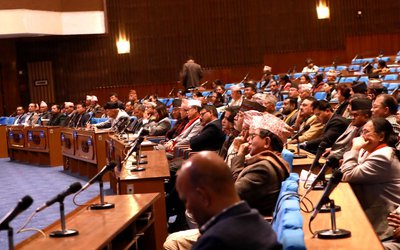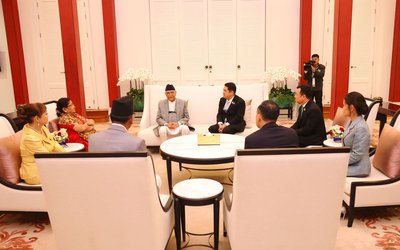More on News


Main Media Advocacy Group and UN Women launch Information Centres in three earthquake affected districts. Following the devastation caused by the series of earthquakes in Nepal, Media Advocacy Group (MAG) with the support of UN Women Nepal has established three Information Centres to provide up to date information on services in the earthquake affected districts of Gorkha, Nuwakot and Sindhupalchowk.
“The main purpose behind setting up the Information Centres is to establish a gender sensitive information sharing mechanism to facilitate the flow of information between women and assistance providers in the earthquake affected districts and to advocate for timely access of relief on behalf of excluded populations”, explained Ziad Sheikh, Representative, UN Women. “Limited access to information prevents women from accessing the multitude of humanitarian relief services. It also prevents women from exercising their full agency and participating equally as partners in the early recovery”, he added.
The Information Centres were set up in coordination with the local government offices and have been welcomed by them. Assistant Chief District Officer of Nuwakot Khagendra Ghimire stated that “the Information Center will provide important information to the earthquake survivors in Nuwakot” and he committed to provide relevant information to the center, as well as to communicate important decisions made at district level, considering its organizational mandate and ethics. Chief District Officer Umesh Dhakal, who recently joined Nuwakot office, also committed his support.
Chief District Officer of Sindhupalchok Mr. Balbhadra Giri thanked the Information Center for its efforts to disseminate information about the services that the Government of Nepal is providing and for giving feedback about places where service delivery needs to be strengthened.
Concurring, PremGiri, Local Development Officer, Gorkha, added: "Applauding this initiation, I believe this Information Centre will ease the information disseminating process between the local people and government authorities."
While the main purpose of the Information Centres is to assist earthquake affected people to access information regarding humanitarian relief support and early recovery programmes, they have a wider function of facilitating women’s access and right to information as provided for in the Right to Information Act. "Social definition of women in our society has limited their ability to claim their right to information, women's social participation and leadership roles are still undermined by the society.
During this phase of the disaster, it is very important to institutionalize the role and access of women to information as a common agenda“, said Babita Basnet, President of MAG. According to her, the Information Centres were born from the provisions in the Charter of Demands, which promotes women's equal access to information.
The Common Charter of Demands was drafted by leaders of women’s groups and organizations from Nepal, with the coordination UN Women, soon after the earthquake on 25 April 2015. The Charter emphasizes the importance of a gender focus for humanitarian assistance and relief that addresses women’s specific needs; and calls for the voices of women and their vital leadership role to be reflected in the relief, recovery, and re-habilitation processes, from decision-making to implementation.
Krishna Hari Baskota, Chief Commissioner, National Information Commission stated: "I am hoping that these Information Centres will help in the effective implementation of people's constitutional right over information that has long been unattended. I believe these Information Centers will foster and strengthen the practice of people asking for and receiving information, especially women.
According to a press release issued by UN Women, the Information Centers are one element of the partnership that MAG and UN Women were finalizing before the tragic earthquakes. The partnership aims to strengthen the capability of the media to implement gender responsive reporting on key gender equality and women’s empowerment issues, including violence against women and girls. The partnership also focuses on addressing relevant areas of concern of the Beijing Platform for Action, which calls for action to be taken in media policy on gender issues, women’s portrayal by media and the relatively low-ranked positions of women in media organizations.
“The Ministry of Women, Children and Social Welfare has prioritized media as a strategic partner in order to promote gender equality, including to tackle gender based violence, through wider dissemination of messages related to protection and promotion of women’s rights. In recognition of the powerful role of the media, the Embassy of Denmark is pleased to support UN Women and its partner MAG to underscore the importance of a gender-responsive media”, said Kirsten Geelan, Ambassador of Denmark to Nepal.

